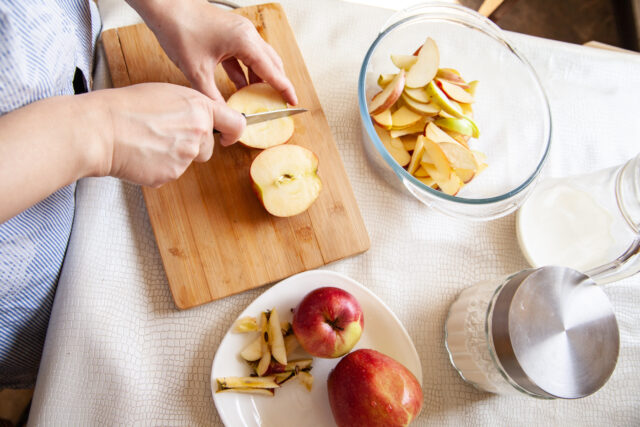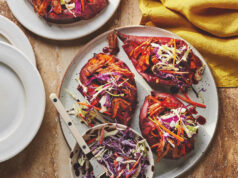In fact, there are over 7,500 apple varieties around the world. The sweetest and most tender make great snacks all on their own, while firmer and tarter fruits are great for baking.
Tips for buying apples
Before you get to eating, you’ll need to choose your fruit. Brianna Shales, marketing director at Washington State apple producer and distributor Stemilt Growers, shared her five quick tips for apple buyers:
- Firmness: “Gently press on the apple to make sure it’s firm to the touch,” says Shales. Avoid fruit with wrinkly or wet skin.
- Bruising: “Check for obvious signs of decay or bruises.” Remember that apples are a natural product, though, so some marks and lumps are normal and won’t affect the taste.
- Color: Though color is “not the best indicator of flavor,” according to Shales, “apples with full color have absorbed lots of sunlight and that can lead to great flavors.”
- Smell: Take a whiff! “Your apple should have a pleasant aroma; some varieties smell stronger than others though,” says Shales.
- Size: It’s helpful to know a bit about the variety you’re shopping for. Some apples, like Honeycrisps, are naturally larger than others, so don’t be alarmed by fruit that’s significantly larger or smaller than the rest of the bin; it’s often not an indication of flavor or age.
The best apples for baking
Once you’ve filled your bushel or peck with a nice selection of apple varieties, it’s time to enjoy them. If an apple pie or quick bread is on the menu, certain options will fare better than others.
According to Shales, the best baking apples are “dense and firm enough to hold their shape during the cooking process.” She recommends Granny Smiths, Golden Delicious, and Pink Ladies. Pinatas are a specialty apple that also holds up well under heat and has a tart and juicy pineapple-y flavor (perfect for a coconut-apple dessert).
For your tortes and tarts, Shales suggests Cortlands, Jonagolds, or Jonathans.
If possible, it’s best to use several varieties of apples for a baking recipe, as each brings its own texture, flavor, and level of sweetness to the table.
Best apples for cooking
In some cases, you don’t want a firm apple that holds its shape well. For example, if you’re simmering homemade applesauce or compote or sweetening a soup with apples, opt for a variety that breaks down easily.
Amy Traverso, author of The Apple Lover’s Cookbook, suggests McIntoshes, Cortlands, and Macouns for these dishes. These apples are also tart, which adds some nice acidity.
One varietal you won’t find on Traverso’s list of the best apples for cooking is Red Delicious. She writes that over a century of breeding for uniformity over flavor and juiciness robbed the apple of its once-succulent bite. “[I] honestly can’t think of a single good use for it,” she writes. With so many more tasty options on display, you won’t miss it.
Best apples to eat raw
A crisp apple makes a tasty and high-fiber snack or salad topping. But the last thing you want in your Waldorf is a mealy, soft, or super-brown chunk of fruit.
To avoid those pitfalls, I suggest shopping for Honeycrisps, SweeTangos, Cosmic Crisps, Fujis, and Pink Ladies. The first three, in particular, “have a thinner skin and great fracture—i.e. they’re easy to chew—that lend well to eating raw,” Shales says.
If you’re looking for something super sweet, my pick would be to reach for a Fuji or Gala. Pink Lady, Empire, and Cortlands are a bit more tart. Granny Smith is much more tart, but still relatively thin-skinned and crisp, if that’s your thing.
And when it comes to salads and charcuterie boards, the goal is an apple that won’t brown, or oxidize, too quickly. Shales suggests Pink Ladies and Cosmic Crisps, and Traverso adds Suncrisps, Ginger Golds, Ambrosias, Fujis, and Galas to the list.
How to store apples
If you went a little overboard with your apple haul, don’t fret. Many varieties of apples can be stored for several weeks. Of course, the better shape your apples are in when you buy them, the longer they’ll last.
Shales recommends stashing your fruit in the fridge crisper drawer. “Be sure to keep them away from strong-smelling foods, because apples could take on that scent.” And keep them separate from fruits and veggies that emit ethylene gas, like bananas, melons, and pears. Ethylene will cause them to ripen and soften faster.
Our editors independently select these products. Making a purchase through our links may earn Well+Good a commission.









